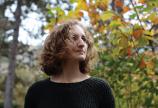Humanities grad helps revitalize Galician language
- Stephanie Harrington

One could say that humanities graduate student Ildara Enríquez was born for her role as a linguistics researcher.
Growing up on the Iberian Peninsula in the northwest region of Spain, Enríquez spoke her native language of Galician at home. At school, she conversed in Spanish. Both were official languages, but as a teenager, Enríquez made a decision.
I started speaking Galician everywhere. I have a choice, and I choose to speak Galician, which is my language.
—Ildara Enríquez, linguistics graduate student
Some 2.5 million people speak Galician, a language that dates back to the 10th century and was at one time banned under General Franco’s dictatorship. That repression, combined with the continued dominance of Castilian Spanish today, has resulted in a decline of Galician speakers. “Fewer younger people speak Galician,” she says. “They tend to want to use Spanish only.”
Although Spanish and Galician are similar, there are important grammatical differences. Galician’s use of seven vowels, instead of the five found in standard Spanish, help set Galician apart, says Enríquez.
In recent years, Galician has enjoyed a resurgence among older Spanish speakers who want to learn their native tongue. But their use of Galician has prompted controversy about the purity of the language and whether Spanish is influencing how it’s being spoken.
As part of her research for a master’s in linguistics, Enríquez decided to test these criticisms. She interviewed 15 new speakers of Galician, gauging their reading, writing, listening and speaking skills.
She focused on a unique grammatical feature of Galician, the clitic system, which marks information like singular versus plural, and the object type. The results of her research were surprising.
“New speakers born and raised in the region seemed to have more Spanish influence in their speech,” Enríquez says. “But those speakers who did not grow up in Galicia seemed to master the clitic system at the same level as native speakers.”
Enríquez says variation in language is healthy and inevitable. She adds that those who were raised outside Galicia perhaps felt a stronger need to assert their Galician identity through language.
Enríquez, who graduates with a master’s degree this month, is continuing her research for a PhD. Linguistics professor Alexandra D’Arcy describes Enríquez’s research as cutting-edge—“the first of its kind for Galician.”
Enriquez, meanwhile, credits the linguistics department for helping her examine her native language’s revitalization. “Galician has always been part of me and part of my life.”

